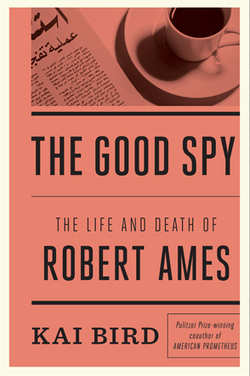In 1979, while I was living through a revolution in Iran that brought my family and I first to France then to the States, the shifting elements that make the Middle East the perpetual tinder box that it is were aligning in Lebanon for a firestorm that would last well into my college years in Boston. Then a young intellectual, sure that I knew all that there was about the Middle East and the ominous Arab Israeli conflict that seemed to color every event in the region, I met a few young Lebanese men who introduced me to an all too personal and painful account of their country's struggles. A Shia, a Sunni and a Christian, these three Arab Lebanese men were friends in Boston and often exchanged viewpoints and ideas with an underpinning of reconciliation that was absent, I suspect, on the diplomatic stage in the halls of power, where decisions are made to keep the Middle East on a perpetual burn.
The Good Spy by Kai Bird chronicles these events in living color through the eyes of Robert Ames, an American CIA man who eventually became the National Intelligence Officer in charge of the Middle East and advised Presidents Carter and Reagan on the events and strategies of this troubled and complicated region -- the latter with respect to Iran and the Hostage crisis along with the failed rescue attempt, the former on Arab Israeli peace that includes Palestinian Autonomy.
Ames presides over the transfer of Palestinians refugees from Jordan to Lebanon, and eventually the evacuation of Arafat and his PLO fighters from Beirut to Tunis with the promise of protection for the residents of refugee camps left behind without their strongest men. Through this gripping tale of love and war, alongside an elusive but ever present ideal for peace, Bird introduces us to the flamboyant characters of Mustafa Zein -- a business man and enabler of back-channels, and Ali Hassan Salameh -- a PLO insider and intelligence Chief who marries a beauty queen and travels to Disneyland.
I first heard about Ali Hassan Salameh through the conversations of my Boston Arab friends. Through their personal stories of friends lost and families broken I realized that amid the frightful tactics used by many in the region in the name of nationhood, there was also a valiant fight for basic rights and self-determination that went largely ignored. I soon realized that those with the greatest fire power in the region had the biggest voice, and the more surgical the attack, the more credible the cause. One was called "terrorism" while the other was termed "the defense of state". I don't know that I agreed with either, but I began to see the frustrating fissures that fueled the venom that kept the Middle East alight, and made a resolution more complex by day. Eventually, I heard about the devastation in Sabra and Shatila through one of these Lebanese men, who seemed genuinely disappointed when he realized I didn't already know that gruesome crimes against humanity were anonymously committed in those refugee camps. I cried for the voiceless dead, but was certain that the solution to this pointless violence was within the grasp of my generation. Robert Ames probably would have agreed with me. Alas, he would fall to the blast of a bomb at the US Embassy in Beirut trying to achieve it.
The Good Spy is an account of all these events through the tale of the CIA's Ames, who had lived in the Arab world, felt the struggle of the Palestinians and become versed in the nuances that made the Arab resistance the complex battle ground that it is. He had recognized that Arab governments are not united in cause but more entrenched in personal power sources. Robert Ames, a classic American man raised in Philadelphia to a steel working father and a disciplinarian mother, had found an interest in these faraway lands and developed a liking for the Arab soul. He learned the language and internalized the struggles of an ill understood people who believe that their collective destiny has been pre-ordained by a God that loves them. Therein lies the essence of an unending struggle against an opposing people who believe the same -- and in that battle all means seem to be justified by the ends. Ames made unlikely alliances with shady personalities in whom he saw the best of their ways and was willing to lend them the credibility to negotiate. One comes away from this book wondering what the world would have looked like if some of the indiscriminate killing from both sides had stopped -- and some hard thought-out solutions were given a chance to engage long marginalized people with a chance to work towards a peace that could spare lives and give hope where there has historically been vengeance and death.
Kai Bird pieces together multiple accounts, recollections, diary entries, letters written home, diplomatic cables and embassy notes to compile a rivetingly detailed account of a time that is essential to world history. In the day of our famed "War on Terror," which seems to envelop so many indiscriminate targets, this is an essential read for anyone involved or even interested in the events that brought us to this day, through the inescapable lens of Middle East peace. On the sidelines, the 1979 Revolution in Iran seems to have provided the fuel, both ideologically and logistically, for much of the mayhem that ensued over the next few decades. In this book, Bird demonstrates through the tale of the CIA's Middle East point man and his contacts, the initial ruthlessness of the Iranian Revolution and the ideological firebrand that spread fast through much of the Arab lands looking for inspiration.
The inspiration turned out to be hollow. But the devastation it wreaked is real and continues today.
The Good Spy, by Kai Bird (http://www.kaibird.com/index.php?view=books&id=72)
Crown Publishers, NY 4/14 (crownpublishing.com)

